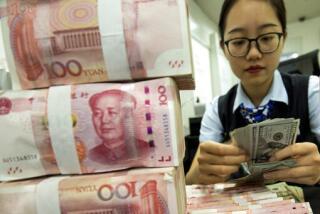Japanese Investments in South China Rise : Economy: The move is seen as part of a bigger shift in Japanese assets to Asia, with a relative decline in emphasis on the United States and Europe.
- Share via
HONG KONG — A new term, Kanan Keizai-Ken (South China Economic Sphere), has begun to appear in Japanese mass media in reference to Hong Kong, Taiwan and China’s Guangdong and Fujian provinces.
Repeating a pattern elsewhere in Asia, Japanese investments in the area are booming--overwhelming the American position in the region and reflecting what bankers and economists see as part of a bigger shift in Japanese assets to Asia, with a relative decline in emphasis on the United States and Europe.
Increasingly, the South China operations of Japan businesses are centered in Hong Kong, the British colony scheduled to revert to China’s control in 1997. The shift could boost Hong Kong’s role as a managerial center for the South China region.
Cumulative Japanese investment in Hong Kong through March, 1991, amounted to $9.9 billion, second in Asia only to the $11.5 billion Japanese investment in Indonesia. By comparison, cumulative American investment amounts to $6.5 billion.
Already, Japanese banks extend 26% of all loans made to Hong Kong residents and corporations and provide 61% of all loans issued in Hong Kong, including those to overseas borrowers, according to Esmond K. Y. Lee, the Hong Kong government’s chief economist. By comparison, American banks provide 10% of the loans to Hong Kong and 5% of all loans issued here.
And while some American banks are closing down in Hong Kong, “every year 10 or more new Japanese banks set up business,” said Sadao Akiyama, deputy general manager of Tokai Bank’s Hong Kong branch.
Japanese banks are responding to strong demand for loans in Hong Kong as part of a larger swing toward Asia.
Fuji Bank, for example, has adopted a global strategy of decreasing its commitments to the United States and Europe and increasing them in Asia, including Hong Kong, said Fusato Suzuki, general manager of the Fuji Bank in Hong Kong.
Japanese investment fund managers too “are adjusting their portfolios--lowering the portion of investments in the United States and Europe and putting more in Asia,” said Shigeto Suda, Nomura Research Institute’s senior analyst in Hong Kong.
Every major Japanese retailing firm has set up stores in Hong Kong. And Yaohan, the Japanese retailer with stores in the United States, has moved its international headquarters here.
“This year we expect 380 billion yen ($2.9 billion) worth of sales globally, and 20% of that will come from Hong Kong,” Yaohan Chairman Kazuo Wada said.
The Japanese have recently shown keen interest in neighboring Guangdong Province in China, the fastest-growing region in the world.
A fall seminar in Tokyo staged by Hong Kong businessmen and government officials attracted 1,300 traders, bankers, construction company executives, research institution staffers--”and one or two politicians”--to a room with a capacity for only 1,000, said Martin G. Barrow, director of Jardine Matheson, the giant British trading and investment company in Hong Kong.
“All of the questions from the audience went to the vice mayor of Shenzhen,” the booming Chinese special economic zone in Guangdong adjacent to Hong Kong, he said.
Nomura Research Institute this year added Guangdong Province as a separate entry in its periodic 10-year forecasts for Asian countries. Nomura foresees Guangdong retaining its position as the fastest-growing region in the world with an average of real growth of 9.8% a year for the next 10 years, Suda said.
Significant investments in Guangdong have been made by Hitachi (a color TV tube factory), Ricoh (copying machines) and Canon (cameras) to produce high-quality goods for exports to their major global markets. Brother Industries Ltd., Japan’s largest sewing machine maker, just announced that it would establish a plant of its own in addition to contract assembly of 10,000 low-priced sewing machines a month for export.
“If those factories are able to stabilize their production lines and achieve quality with their cheap labor, that would induce big investments from other Japanese firms,” Suzuki said
But some Japanese businesses have hardened attitudes toward China since the 1989 Tian An Men incident, in which Chinese troops killed hundreds of pro-democracy protesters in Beijing, “China was special for Nomura Securities. In the 1980s, Nomura’s top management was eager to help China become a good participant in the world financial market,” Suda said.
Nomura invested in a wholly owned hotel in Shanghai, a joint-venture office building in Beijing, a joint-venture bank in Shenzhen and even a shrimp farm, Suda said. It also served as underwriter for the first major Chinese bond issues in Tokyo and made recommendations to many Japanese companies to invest in China--”just to promote China,” he added.
“We didn’t even receive any consulting fees” and charged less-than-normal commissions for underwriting, he said. But from now on, Suda added, “we intend to engage (only) in profit-oriented business” with China.
Japanese bankers have also changed. Before Tian An Men, Japanese banks fought among themselves to extend more and more loans to China at ever-thinner profit margins, said one manager of a Hong Kong branch of a leading Japanese bank. Loans were expanding by 20% and 30% a year, he said.
Now margins have been raised and growth limited. And after enduring more than a year without new loans because of Tian An Men sanctions, Chinese now “are overwhelmed with joy to get them,” the banker said.
More to Read
Sign up for Essential California
The most important California stories and recommendations in your inbox every morning.
You may occasionally receive promotional content from the Los Angeles Times.












